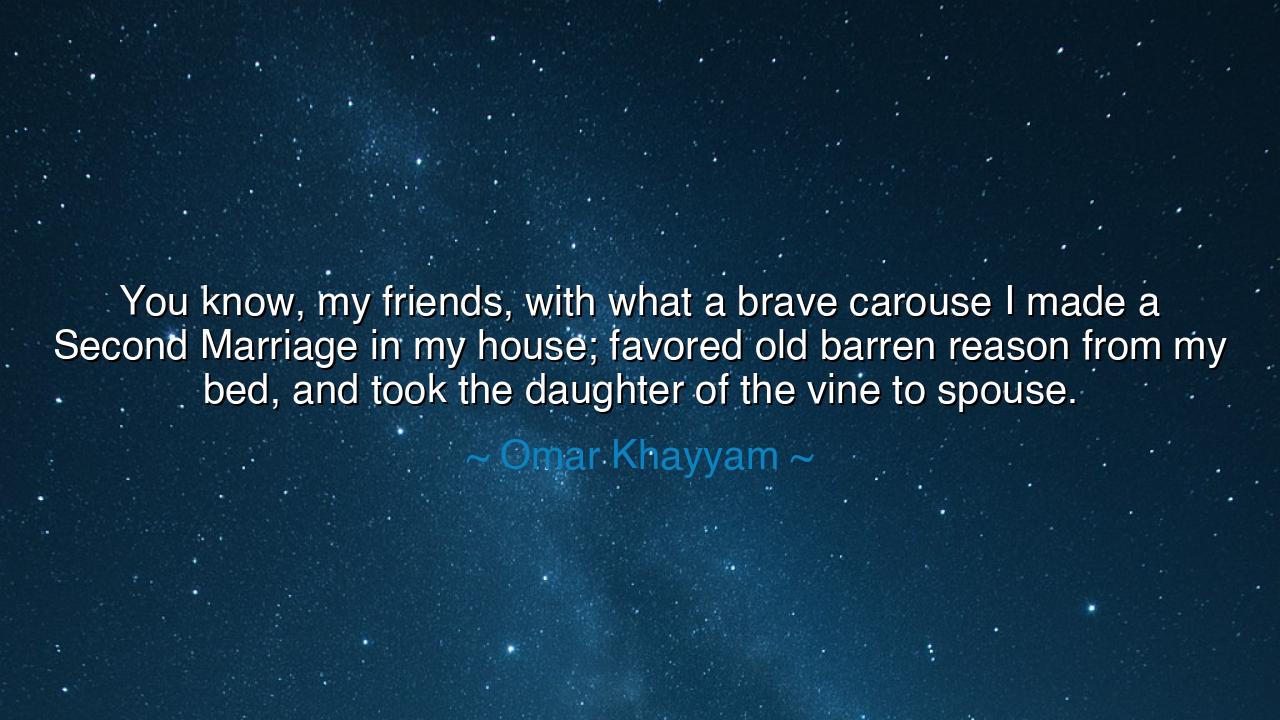
You know, my friends, with what a brave carouse I made a Second
You know, my friends, with what a brave carouse I made a Second Marriage in my house; favored old barren reason from my bed, and took the daughter of the vine to spouse.






Omar Khayyam, the poet of Persia, mathematician of the heavens, and singer of wine, once declared: “You know, my friends, with what a brave carouse I made a Second Marriage in my house; favored old barren reason from my bed, and took the daughter of the vine to spouse.” In these words he gives us more than verse; he gives us a confession of the heart, a testimony of a man who chose joy over cold logic, and the ecstasy of life over the austerity of sterile reason. It is a declaration of freedom, spoken with the rhythm of defiance, as though he were teaching the soul to live unchained.
When Khayyam speaks of his Second Marriage, he does not mean the literal taking of another bride, but the wedding of his spirit to wine and delight. His first companion, he tells us, was reason—the cold bedfellow of scholars, who lives in dusty halls of logic, measuring life in proofs and numbers. Yet reason, he calls “barren,” for though it feeds the mind, it leaves the heart famished. So he cast it aside and embraced instead the “daughter of the vine”—wine, symbol of passion, intoxication, and the unmeasured joy of existence. This is not the rejection of wisdom, but the rebellion against a wisdom too dry, too narrow, to satisfy the depths of the soul.
In Khayyam’s imagery, wine is more than drink—it is the symbol of freedom, of divine madness, of the fire that releases the spirit from chains. The Sufis of his world often spoke of wine as a metaphor for mystical ecstasy, the intoxication of God’s love, though Khayyam’s verses blend both the spiritual and the earthly. By taking wine as his spouse, he declares his loyalty to the art of living fully, to savoring beauty, to embracing the fleetingness of life. For what is life but a brief cup, filled today, emptied tomorrow? In this carouse, Khayyam finds courage, not despair.
History, too, shows us the tension between reason and joy. Consider the life of Socrates, who dwelt much in the halls of reason. He drank deeply of philosophy, questioning all things, yet his end was bitter—the cup of hemlock forced upon him by those who could not endure his inquiries. By contrast, Khayyam chose another cup: the cup of wine, the cup of life. Where Socrates sought truth in the dialogue of minds, Khayyam sought truth in the intoxication of the heart. Both are paths to wisdom, yet Khayyam warns us that reason alone, without delight, is a barren companion.
The deeper meaning of this verse is not merely a call to drunkenness, but a call to balance. Life, he teaches, cannot be lived in formulas and arguments alone. The soul needs more than reason; it needs warmth, laughter, and joy. To wed oneself to reason without passion is to live half a life. But to wed oneself to the vine—to embrace the fleeting beauty of the world, to laugh in the face of death, to drink deeply of the present moment—is to live wholly. Khayyam’s “Second Marriage” is therefore not abandonment of thought, but the union of thought and passion, with passion crowned as queen.
The lesson for us is radiant: do not let your days be consumed only by the dry pursuit of calculation, nor think that truth lies solely in logic. Allow yourself to drink from the cup of joy. Celebrate beauty, friendship, art, love, and even the fleeting pleasure of the vine. Remember that to be alive is itself a miracle, and that reason, though noble, cannot alone satisfy the human heart. The wise man is not he who knows all formulas, but he who can laugh, rejoice, and embrace the moment before it passes into dust.
Therefore, let us act with courage, as Khayyam did in his verse. Take time to celebrate, to share wine—literal or metaphorical—with your companions, to let laughter echo against the silence of mortality. Let reason guide your mind, but let joy guide your soul. For as Omar Khayyam teaches, the true life is not one of barren reason, but one where the heart weds passion, and where every fleeting day is lived as a feast.
Thus his words remain a lantern for all who wander between calculation and delight: “I made a Second Marriage in my house… I took the daughter of the vine to spouse.” They remind us that wisdom is incomplete without joy, that truth is not only thought but lived, and that to honor life fully is to embrace it with both mind and heart, reason and wine, discipline and delight.






AAdministratorAdministrator
Welcome, honored guests. Please leave a comment, we will respond soon